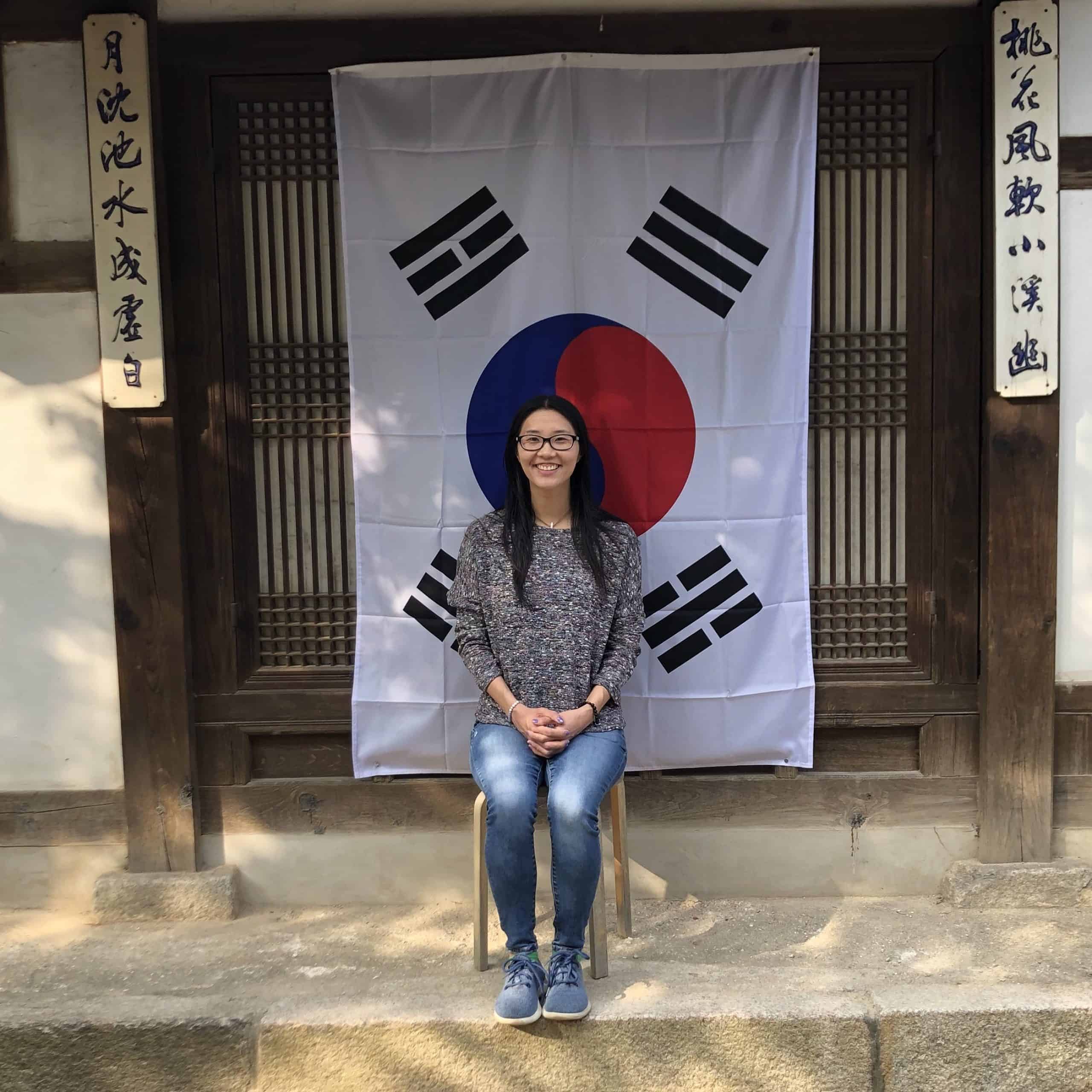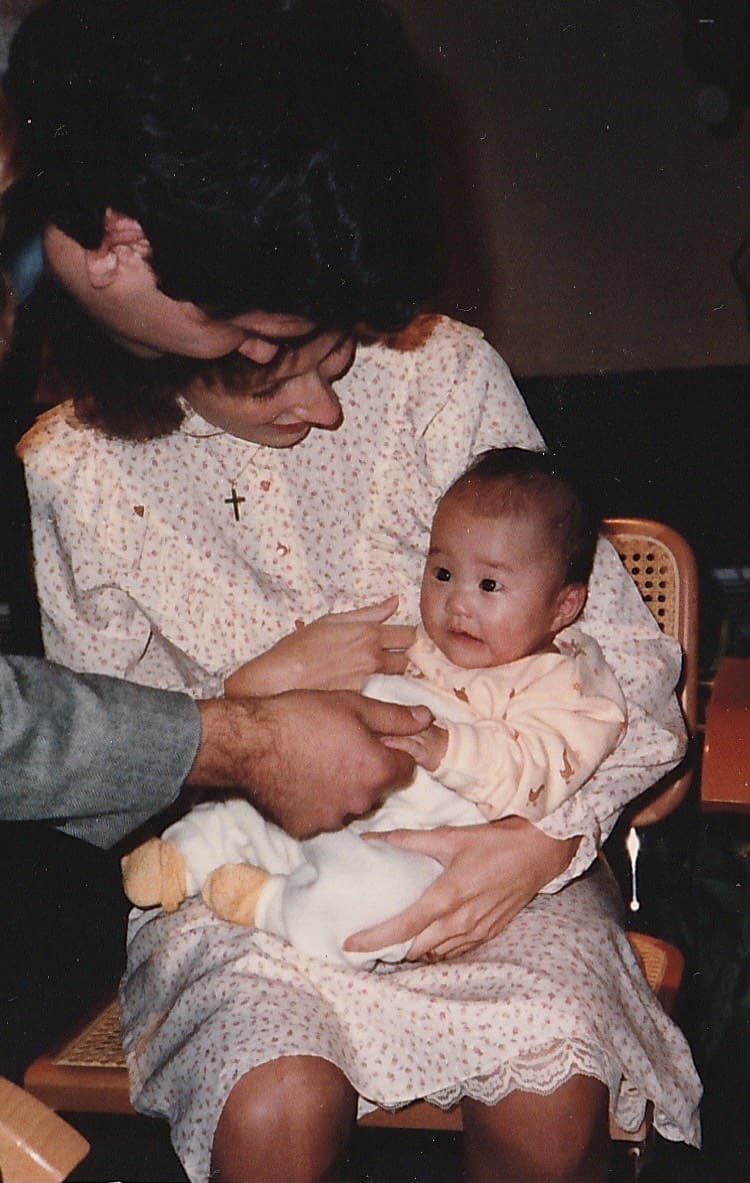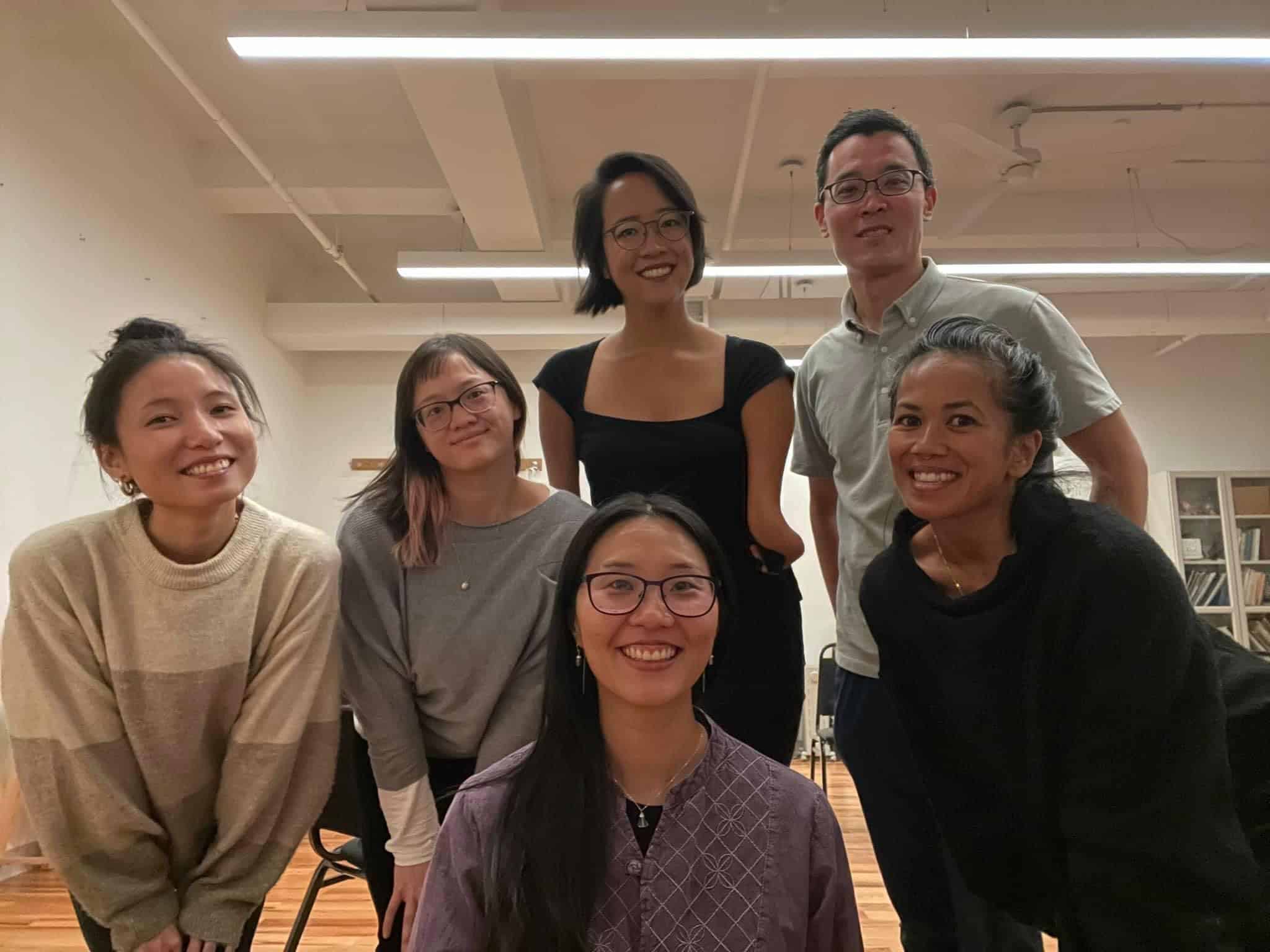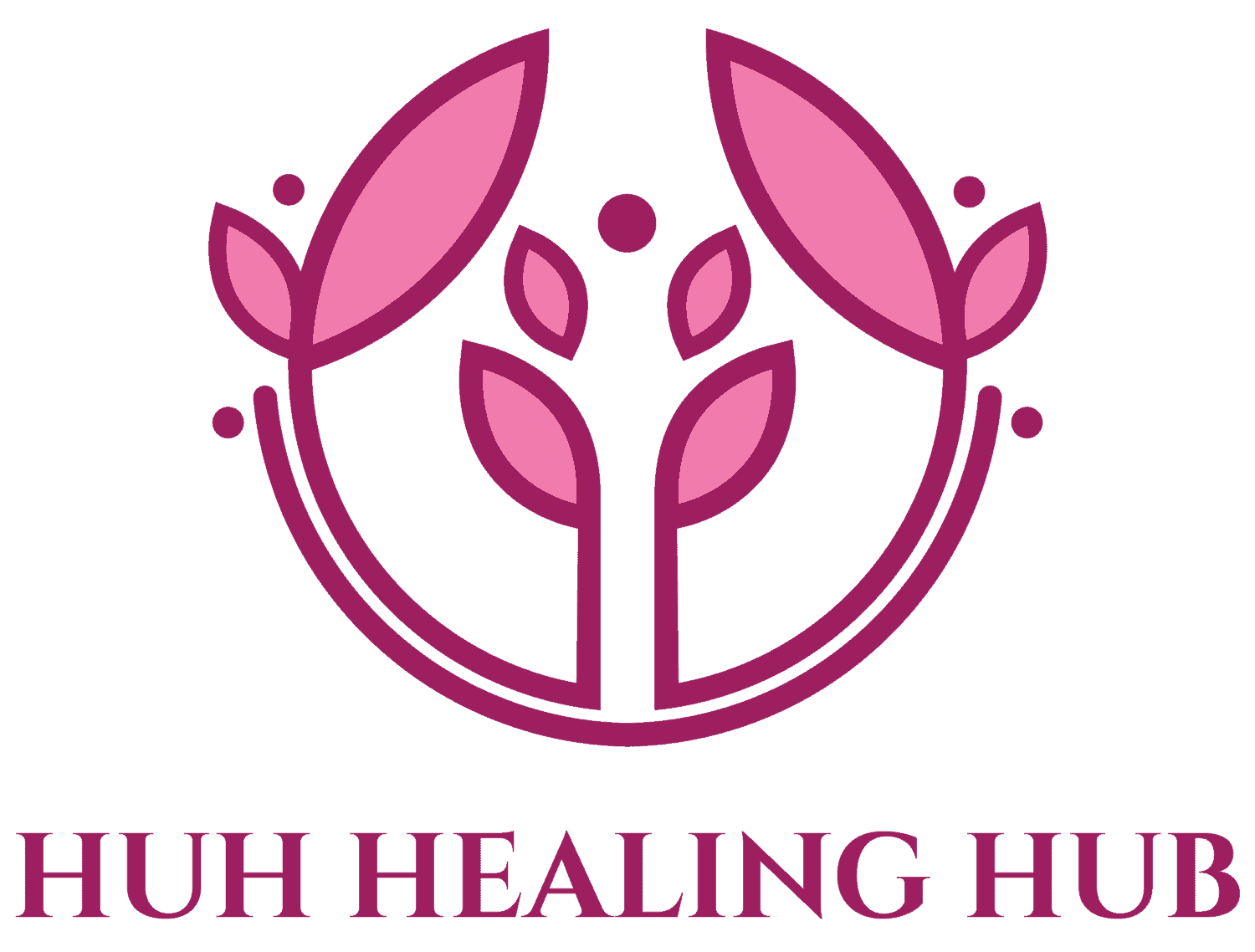IAMAdoptee spoke with Reiki Master Heather Schultz Gittens, adopted from Korea, about her experience in finding meaning and healing through the practice of Reiki.
What is your name(s)?
My name is Heather Schultz Gittens. My birth name is Huh Mee-Young. My pronouns are she/her.
How do you identify yourself?
My identity is not limited to one area. It is holistic. I identify myself in six categories based upon my ethnicity, family, race, gender, career and spiritual connection.
- Korean adoptee
- Wife/daughter/sister/friend
- Asian American woman
- Reiki master
- Fearless educator and writer
- Domestic violence survivor
Where were you adopted from and when? If you would like to share any aspects of your life before adoption, please do.
According to my adoption records, I was born in Seoul in South Korea on July 4, 1984. Before my adoption, I was with my foster mother for three months. I was adopted at 4 months old by a white couple from Farmingdale in Long Island. Since my mother had endometriosis and multiple sclerosis, she wasn’t able to give birth. Although my time was limited with my mother, I know how deeply she loved me. If she was still alive, I know that she would fully support me in the search for my birth mother.
What is Huh Healing Hub? And what motivated you to create this company?
In 2019, I launched my own Reiki business (Huh Healing Hub LLC) in Queens, NY. I included my Korean surname (Huh) into the company name because Reiki helped me heal wounds from my adoption. Reiki is a Japanese energy healing technique that addresses energetic imbalances, reduces physical issues associated with blocked chakras, and promotes relaxation.
Huh Healing Hub provides in-person and virtual Reiki treatments that are tailored to each client’s intentions. These sessions help individuals transform old thought patterns, remove emotional blockages, and reduce stress and anxiety. Huh Healing Hub also hosts in-person and virtual workshops and healing circles focused on self-love, personal power and mindfulness.
My Reiki journey began in 2012 with my spiritual teacher and life coach Lily Rubinstein. I started to explore buried emotions of grief, shame and anger from my experiences as a transracial adoptee and motherless daughter in her monthly healing circles and private sessions. My identity was defined and shaped by trauma for close to three decades. I didn’t know my identity behind a mask of pain.
Reiki helped me address the fear of abandonment from my adoption, reparent my 10-year-old self who was still grieving from the loss of my mother to multiple sclerosis in 1995, and find my authentic voice. After experiencing these massive shifts, I decided to start my Reiki training.
In 2016, I received my Reiki 1 certification from Lily’s Center of Inner Wisdom in Long Island. One year later, I received my Reiki 2 certification. After I finished the second level, resistance and self-doubt prevented me from continuing my training. Once I acknowledged and released my discomfort and fear, I decided to become a Reiki Master in 2018. When the training ended, I questioned my readiness to form my own Reiki practice.
After reflecting on my commitment to help others liberate themselves from emotional scars, I started to reprogram my initial thoughts about opening a Reiki company. Once I acknowledged and released my negative self-talk and self-sabotaging behavior, the energy shifted throughout the pathways of my mind, body, soul and spirit. I transformed my thinking, embraced entrepreneurship and created Huh Healing Hub.
Are there specific programs you are creating or have created for the intercountry adoptee community?
Since 2016, I’ve led several writing and Reiki workshops for adoptees through Also-Known-As (AKA) and AdopteeBridge. I especially enjoyed facilitating a three-part writing workshop series from 2017-2019 for intercountry adoptees through AKA based on all three parts of “The Primal Wound: Understanding the Adopted Child” by Nancy Newton Verrier. We processed our emotions around the primordial separation from our birth mothers, explored how these emotions have manifested into our adult lives, claimed our worthiness, and shared our own steps to healing our inner children. It was a transformative experience to listen to the healing journeys and reunion stories of my fellow adoptees.
In 2020, I co-led a virtual writing, meditation and art therapy workshop about wellness and suicide prevention for adoptees with my incredible friend Leah Garlock. After a strong turnout, we were invited to lead a similar workshop for AdopteeBridge. Our “Healing from the Inside Out” workshop is a safe space for adoptees to process, heal and celebrate their identities by tapping into their creativity and self-expression.
Is there a conversation in the intercountry adoption community we should be having more of?
Yes. We must continue to discuss the injustice of the deportation of intercountry adoptees, support deported adoptees, and urge our local U.S. senators to pass the Adoptee Citizenship Act of 2021 (which is part of the America Creating Opportunities for Manufacturing, Pre-Eminence in Technology, and Economic Strength Act of 2022). The U.S. House of Representatives passed the America COMPETES Act with the Adoptee Citizenship Act on Feb. 4, 2022.
If you’re interested in moving the Adoptee Citizenship Act of 2021 forward, please sign this petition to ensure citizenship for all intercountry adoptees: https://www.adopteesforjustice.org/take-action.
If you would like to support deported adoptees, please make a donation here: https://adopteeadvocacy.org/. All donations and proceeds directly support deported adoptees as they try to live in their countries of origin.
In what ways has your identity as an adoptee changed, evolved, or developed over the years?
When I returned from my first trip to South Korea in 2014, I was eager to connect with fellow adoptees. Many reached out to me including Samantha Futerman (Korean American adoptee and actress) after my first personal essay was published in NBC News.
In 2015, I became involved with various adoptee organizations in New York City. I served as a Board Member of AKA from 2015-2016, worked as a part-time Tween Group Facilitator for All Together Now from 2015-2016, and worked as a full-time Communications and Development Manager for The Donaldson Adoption Institute (DAI) from 2016-2017. Due to my work in the adoption community, I have become more understanding and compassionate toward my birth mother’s decision to relinquish me for adoption.
My mental health was drastically impacted since all of my work was tied to my adoptee identity. I realized that I couldn’t continue all three roles. I resigned from All Together Now in 2016. Then I left my board position for AKA the same year. And then I was laid off from DAI in the summer of 2017 since the adoption research and policy think tank was facing an imminent close due to insufficient funding.
Within time, I learned that I don’t have to work in adoption, read every adoption book/adoptee memoir, listen to every adoption/adoptee podcast, and watch every adoption movie to be connected to my identity as an adoptee. I’m not less of an adoptee for not doing these things.
Are there any ways you have incorporated your – heritage/culture into your daily life?
Yes – I have incorporated my Korean heritage into my life in various ways.
- Language
I’m currently taking a Beginner Korean 1 class online through AKA. This is my fourth time taking this class. I didn’t finish the other classes due to devastating losses in my family in 2020 and 2021. Now I’m in a healthier space to learn Korean. - Food
Earlier this year, I discovered Joanne Lee Molinaro (@thekoreanvegan) on Instagram and bought “The Korean Vegan Cookbook.” I made one dish (jjajangmyun – black soybean noodles) from her book. I’m excited to make more of her dishes.
I’ve also learned how to make kimchi and bulgogi through Emily Kim’s (Maangchi) cooking blog. - Spirituality
During my first trip to Korea, I attended weekly meditation classes. My friend who let me stay with her introduced me to her meditation family. The majority of the students wore traditional meditation outfits. One of the students bought a beautiful purple meditation outfit for me from Dongdaemun Market. I feel deeply connected to my Korean heritage and ancestors whenever I wear this meditation outfit.
Meditation was a vital part of my healing experience in Korea. I still remember the mission that Mr. Kim (my meditation teacher) gave me: to become a meditation master and teach Korean meditation to Americans. This is next on my list. - Hiking
Since mountains cover 70 percent of Korea, it’s no surprise that hiking is a popular pastime for Koreans. During both of my trips to Korea in 2014 and 2019, I hiked different trails of Bukhansan Mountain in Seoul. My husband proposed to me after we hiked to Guknyeongsa Temple in Bukhansan in 2019. It was so meaningful that he chose this spot in my birth country for the proposal.

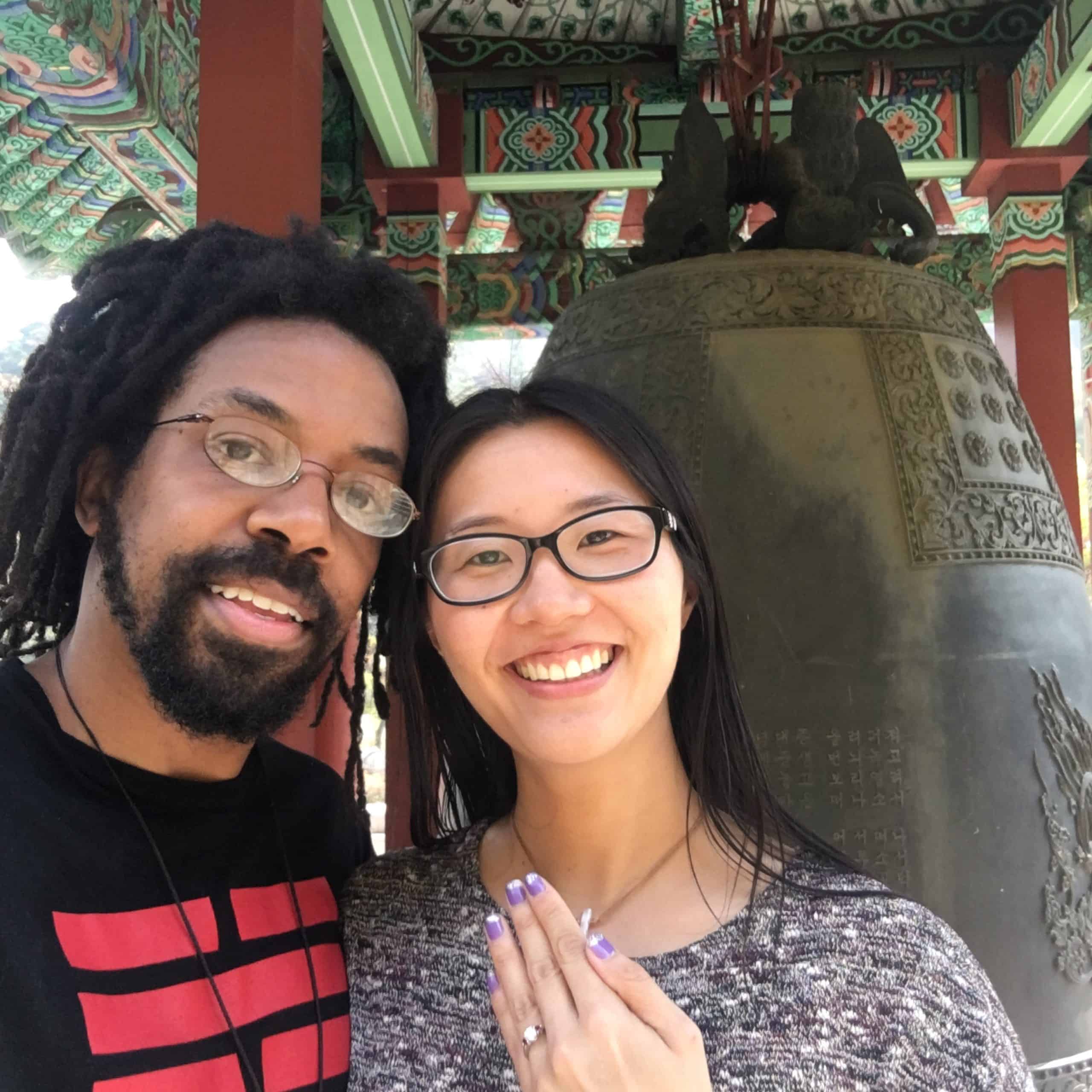
Hiking remains one of my favorite recreational activities. Last August, I visited Acadia National Park in Maine with my best friend Laura Cerrano (who is a Colombian American adoptee). During one of our hiking trail adventures, we met three generations of Korean women (a grandmother, mother and daughter). I felt comfortable enough to share my adoption journey with this family and proudly showed them my birth name necklace. The mother even offered to share my “Looking For Mom” interview with The Korea Daily with her sisters and their networks in the Korean American community.
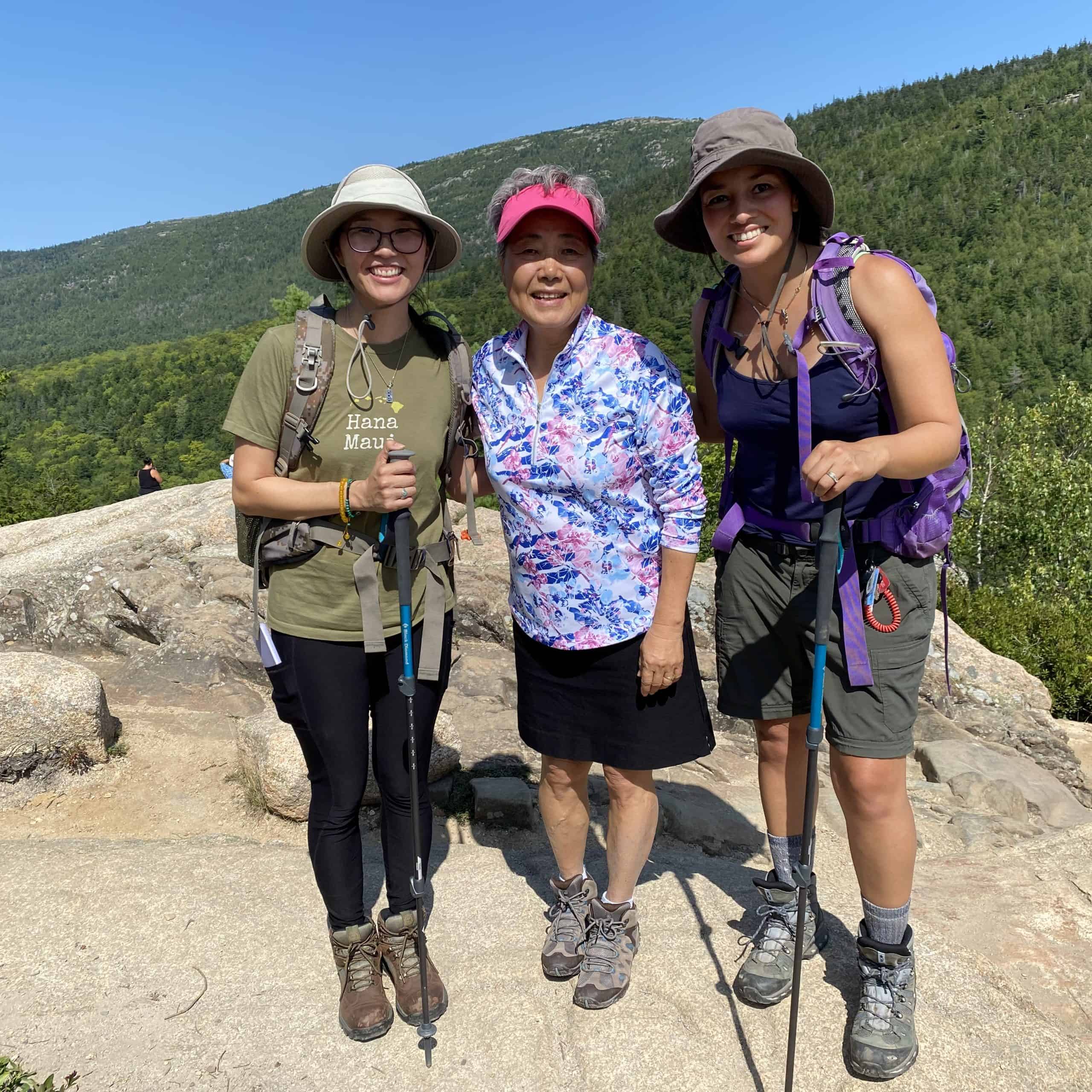
This encounter reminded me of a hiking adventure in Harriman State Park (second largest state park in New York) in 2016. I met a friendly Korean couple who encouraged me to resume my birth mother search and even offered to help.
Is there one book, film or movie you would recommend to fellow adoptees?
Yes – the “Kung Fu Panda” series. I believe that this franchise honors the complexities of the adoption triad (adoptee, birth parent and adoptive parent) with care and thoughtfulness. The main character, Po, is a panda with an adoptive father as a goose (Mr. Ping). In “Kung Fu Panda 2,” Po navigates the emotional wounds of being separated from his birth parents and experiences an identity awakening. In the third film, Po’s birth father (Li Shan) returns. Li Shan and Mr. Ping learn that they both can be part of their son’s life together. Although this animated movie series is an example of a positive adoption journey and reunion, I fully understand that this may not be the case for many adoptees.
Overall, I believe that more film and TV producers, directors and writers need to hire adoptees as consultants on movies and TV shows that are centered on adoption. I’m tired of the common adoption stereotypes depicted on the screen — adoptees with behavioral issues (“Problem Child”), adoptive parents as the white saviors (“The Blind Side”), and birth parents who are incapable and unworthy of raising their children (“Black or White”). These negative stereotypes are harmful to the adoption triad. I’m also tired of the overused origin story of superheroes as orphans.
How do you take care of yourself?
I truly believe that the most important relationship that you have is with yourself. Self-care is a vital part of my life. In order for me to be of service to my college students and Reiki clients, I must be of service to myself first. I look at self-care in four buckets (physical, mental, emotional and spiritual). My physical self-care activities include walking, yoga and hiking. My mental self-care activities include meditation, yoga and coloring. My emotional self-care activities include Reiki, writing and setting healthy boundaries. My spiritual self-care activities include Reiki, meditation and praying.
Learn more about Heather’s adoption journey in these interviews and personal essays:
- NBCNews.com: A Korean Adoptee Starts the Search for Her Birth Family (Personal Essay, October 2014)
- NBCNews.com: The Search for a Birth Family Leads to Seoul and Back Again (Personal Essay, December 2014)
- Adapted Podcast: Season 4, Episode 8 (Podcast Interview, December 2020)
- The Korea Daily: Looking For Mom Series (Video Interview, June 2021)
Learn more about Heather Huh Healing Hub work in these interviews and videos:
- Yung Hip Professionals: Influencer of the Month (Video Interview, March 2021)
- Right Brain Journeys: Cultivate Calmness (Mindfulness Meditation and Video Interview, January 2022)
- Fearless Communicators: Your Story Now (Signature Stitch Video, February 2022)
About Huh Healing Hub: We help people liberate themselves from emotional scars, remove negative self-talk and self-sabotaging behavior, embrace their personal power, and cultivate calm in their lives.
By providing virtual Reiki treatments that are tailored to each client’s intentions, we help individuals align their chakras, expand their consciousness, reduce stress and anxiety, and remove energetic blockages.
Huh Healing Hub also hosts online self-empowerment workshops and healing circles focused on self-love, mindfulness and transformation.
Learn More About Huh Healing Hub

